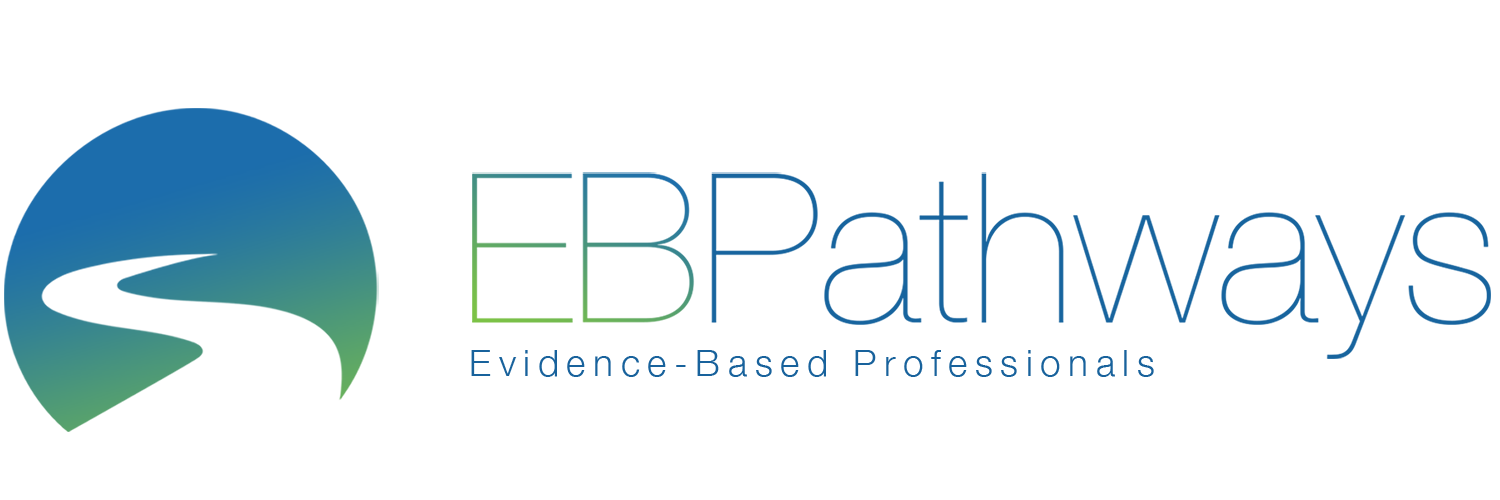Abstracts - PATHWAYS For Evidence-Based Case Management, Care Coordination & Supervision-Fall-2018

NEW! The Evidence-Based Practitioner: Core & Advance Skills in Practice
The standardized program developed as formal education for practitioners in the human, social and justice services fields related to helping people acquire or strengthen the ability to perform critical life functions necessary to thrive in any life domain. The object of this training moves us in the evidence based direction as practitioners to help us be useful in any situation as they help people improve and move forward with their lives vs punishing or "rehabilitating".
This training focuses on the application of skills characterized as evidence based "common elements". In a world of countless "evidence based" approaches, the aim of this course is to teach practitioners the core elements for being both evidence based and strength centered. The Common Elements in EBP demonstrate a shift from Diagnostic Driven, Clinically Driven, and Problem Driven Approaches to “Partnering” as an advanced skill.
“Partnering” is a term that operationalizes a deeper knowledge and skillful application of sophisticated facilitation skills by the practitioner. In effect this advances the skills of the practitioner beyond expert knowledge of disorders and their remedies to a level of facilitation that impressively enables the person being served to benefit from the contact moment, in any method, program or practice.
Program Goals and Objectives
Participants in the program will receive formal education in how to help their clients regain or strengthen their ability to perform critical life functions necessary to thrive in any life domain and ultimately be skillful in the application of evidence based and strength centered approaches. The programwill briefly review the 10 modules in the programs.
Module-1: Learn how to plan for continued personal and professional development following formal education. Going beyond just formal degrees and licenses and learning what to do to insure their continued professional development.
Module-2: Get a clearer more advanced understanding of “Evidence based” practice, programs and treatment/service plans - beyond the typical introductory and moderate definitions. What kinds there are, their meaning, what they are for, how they work, why they important, how you do them, and etc.
Module-3: Be able to distinguish between EB and intuitive. Move toward recognizing and making use of that which is intuitive in your practice.
Module-4: Learn to be able to test and discover the value of intuitive practice in order to determine when and how to use it. Practice based evidence. How to make use of intuition they possess and move those activities toward becoming evidence based
Module-5: Be in a position to evaluate and rate own practice for fidelity and efficacy
Module-6: Be in a position to develop a plan to improve own practice using the results of a self evaluation. Make use of the plan developed to improve their practice.
Module-7: Learn the various EBP's and their uses in all practice. Learn which are specific to your domain and work to specialize in the use of one or more for their particular domain
Module-8: Gain fundamental working knowledge of more than 2 or more evidence based approaches that are relevant to their specific domain, learn how they fit together as part of the larger whole.
Module-9: Be in a position to design and document practices in a manner that helps them adjust the fluid step by step logical process, demonstrate the development and adjustment of treatment/service plan in order to facilitate the recovery process.
Practitioners must document the way that they practice and understand its purpose to evolve the plan from the beginning to the end, have it show up in a certain way that connects to the reason for plan, its process and the adjustments for plan to achieve the intended outcome.
Module-10: Path an annual training and staff development programs for evidence based practices to deepen the knowledge of methods and of the theoretical background for the use of evidence based approaches. Membership in a professional group to foster professional engagement and ongoing development.
-
Opioids Addiction: Case Management with Addicted Individuals, their Families, and Their Communities
(NOTE: SAME CONTENT IS PRESENTED FOR THE AM AND PM WORKSHOPS SESSION)
Of the 20.5 million Americans 12 or older that had a substance use disorder in 2015, 2 million had a substance use disorder involving prescription pain relievers and 591,000 had a substance use disorder involving heroin. Currently, the nation has a crisis on its hands thats been characterized as a "crisis of epidemic proportions facing our nation".
What do you understand all this to mean? What do you know about opioids? Why is it an epidemic? How and where do practitioners fit in? What are the implications and impacts on the individual, their families and communities which surround them?
This 4-part workshop on the current Opioid crisis in America will address the impact of Opioids on the individual, family, community and social service/criminal justice organizations. The series will also review necessary case management knowledge and skills for effective interventions, securing housing as part of recovery and offer a candid discussion with an individual/family who has over 10 years of experience with opioids/heroin: from prescribed medical treatment, to use/abuse and addiction: it impacted the whole family! You are invited to attend 1, 2, 3 or all 4 parts of the workshop.
Opioids Addiction: An Overview & How Its Similar to or Different from Other Addictions
64,000 drug overdose deaths were estimated in 2016 (drugabuse.gov.)! In many ways, this current epidemic is both similar and different than other addictions.
Attend this interactive session to learn and share knowledge of the impact of an addiction to opioids.
The workshop will review the impact of the opioid addiction on the human brain and consequently communities, families, and your social service/criminal justice organization.
Opioids Addictions Treatment, Management & Recovery: Stage-matched Approaches
The recovery process is fluid and subject to change on a monthly, weekly, daily and sometimes hourly basis. This fluidity impacts all members of the recovery team (individual, family, organizations).
Attend this session to learn and practice using solution-focused questioning to connect with the consumer(s).
You will also review the 6 Stages of Change, and how they can be used as a guide plan development and interventions.
- Helping Individuals Regain Emplyement (H.I.R.E.): Core Skills
Basic Programming Development of Core skills needed for Barriered Populations:
The primary purpose of this H.I.R.E program is to assist clients with multiply challenges obtaining gainful employment, provide training opportunities for skills currently needed by regional area employers, and provide access to a wider range of resources that will assist in meeting their job search and retention needs. The Helping Individuals Regain Employment (H.I.R.E) will provide multiply challenges participants a supported and structured case managed navigation through the career exploration, job search, job placement, and job retention processes. Most H.I.R.E applicants or recipients do not have the needed skills to complete self-directed job search that lead to gainful employment, which will help lead their families to self-sufficiency.
Workshop Outline:
Goal: Participants will learn overview and outlines needed to provide workforce development, job creation and workshop options for highly barriered populations.
Objectives:
1. Populations Served
2. Basic Workshop Outcomes and Goals
3. Outline of Workforce Development Remedies
- Evidenced Based Practices for Effective Case-Management: Core & Advance Skills
This pre-conference workshop teaches the essential processes for assessing, planning, facilitating and advocating for options and services designed to help human and justice services clients efficiently meet their individual needs. It is intended to prepare the practitioner for developing advanced and intentional skills by helping them develop a deeper understanding of the way in which approaches and dialog affect the recipient. This knowledge is fundamental to the practitioner’s ability, not only to understand how the brain works in dialog, but also how the use of approaches that are facilitative and guiding versus prescribing and correcting increase the ability of the recipient to benefit from the care and supervision provided.
Case managers and care coordinators are assistive, collaborative partners providing guidance and supports. At this program participants will be able to learn how to play their strength-centered role to help individual clients they work with achieve outcomes they desire. Using relevant examples, participants will learn how they can help their clients achieve desirable outcomes through promotion of quality and effective interventions which link individuals to appropriate resources.
Learning Goals & Objectives
On this program, participants will be in a position to learn;
- Current trends in care coordination
- New state and federal requirements
- Strength-centered vs. deficit-based approaches
- Components of successful care coordination
- Successful transfers to insure delivery of integrated delivery of services
- Care Coordination: Interventions and Discharge Cues
- Linking people with systems that provide them with resources, services and opportunities
- The Case Manager's Role, Tasks and Functions
- Client Level Interventions (face-to-face)
- Support for the Dual Role
- Deficit Based Case Management Strategies
- Strength Based Case Management Interventions
- Strength Based Case Management Activities
- Strength Based Case Management Approach
- Making Sense Out Resistance
- Case Management Process
- Facilitated Activities
- Determining clients’ level of readiness for change by Using Motivational Interviewing and the Transtheoretical Model for Change
- Stage-matched recovery oriented goals, objectives and interventions for increased accountability and improved client outcomes
-
REPEAT OF OPIOIDS PROGRAM FROM AM
- Helping Individuals Regain Emplyement (H.I.R.E.): Advance Skills
Advanced Programming for Development of Core skills needed for Barriered Populations:
This advanced session will take the concepts of HIRE and put into a workable model for your population. This workshop will build on the model presented in the Basic HIRE workshop to provide the needed outlines, workshop topics and program monitoring needed. This model will show the alignment of outcomes with the various Workforce Development program including WIOA, TANF, SNAP E&T and other federally mandated workforce development programs. The Helping Individuals Regain Employment (H.I.R.E) model provides agencies with the needed tools to will provide multiply challenges participants a supported and structured case managed navigation through the career exploration, job search, job placement, and job retention processes.
Workshop Outline:
Goal: Participants will learn evidence-based workforce development, job creation and workshop facilitation.
Objectives:
1. Frame Work for Outcomes and Goals
2. Process for Alignment of Program Outcomes
3. Implementation of Programming
4. Workforce Remedies
Return to event page >> to event page >>
DAY - 2 - NOVEMBER 29
KEYNOTE ADDRESS
TBD - Thank you...
CHOOSE FROM THREE (3) CONCURRENT TRACKS FOR EACH ENGAGEMENT TRACK
Individual Motivation Engagement Track
- Theory & Principles of Counseling: Brain-Based Dialog Skills for Durable Outcomes
This Presentation is intended to help the case manager (or any practitioner) learn how to practice “intentionally” rather than intuitively. Or, learn to use intuitive methods that are informed by a solid knowledge of how the brain works in a dialog. Participants will learn how to move recipients into the active role and promote change rather than relying on the use of problem identification, diagnosis and prescribing of remedies which push the person to the passive role. Forms of motivational interventions, strength-based strategies and interventions for any level of readiness will be covered.
- Fundamentals of Motivational Interviewing (MI) & Brain Based Therapy
While this conference offeres several opportunities for focused study and applications for motivation enhancing methods, this presentation will deliver the fundamental elements of Motivational Interviewing for someone new to MI or needing a refresher. The participant will learn the Spirit, Principles, and techniques, as well as hot to elicit and strengthening change talk and developing a change plan. These techniques will be demonstrated in case work that is familiar to the participant.
- Finding and Using Motivation for Addressing Resistance and Promoting Change in Hard-to- Serve Recipients
This session is intended to help the participant understand the functions of resistance and shift from struggling with the frustration of resistant behavior to making sense of resistance and assisting the person. The participant will learn the cause of frustration and be able to avoid the traps associated with it in order to make use of resistance to strengthen participation and promote change. Principles of “rolling with resistance”, “developing discrepancy” and “eliciting change talk” will be included
Family & Community Engagement Track
- How To Build Collaborative Relationships With Clients & Their Relationships for Effective Case Management
A core component to successful intervention is a trusting relationship between the professional and the consumer. A component to building trust is for both parties to clearly understand the purpose, role and function of the relationship/intervention.
Attend this interactive session to review core components to beginning to build a relationship with consumers. Special attention will be provided regarding engaging resistant and mandated consumers and significant others in their lives.
- Goal Setting and Plan Development with Working With Individuals and Their Families and Groups
Once the purpose role and function of a relationship is established it is important to develop clearly defined goals, objectives and tasks. What is the desired outcome of our professional relationship (goal)? What measurable change are we working towards achieving (objectives)? What actions need to occur to achieve the desired goal and objectives? When goals objectives and tasks are clearly defined, and understood during the contracting stage of an intervention the likelihood of achieving your programs desired outcomes will improve.
- Prioritizing Interventions
Have you ever had so much to do you become overwhelmed you are unable to complete anything? Or you just choose to do nothing? It is a skill to collaborate with individuals/groups to prioritize interventions and next steps.
Attend this interactive workshop and practice and learn how you can prioritize interventions.
Systems & Supports Engagement Track
- Current Trends & Remedies in Workforce Development:
This workshop offers an overview in current trends in Workforce Development and how to utilize them to customize outcomes for your region and populations. With the continued changes in the US Workforce, it is imperative that programming is able to keep up with the demand. By having a clear understanding of the trends and remedies, programming can be changed as needed to ensure success of our clients, successful program outcomes and continued employer engagement. This continued review of your agency programs you will better be able to help your career counselors stay relevant in Workforce Development.
Current Trends:
1. Career and Workforce Systems Design
2. Industry Specific Certifications
3. K-12 Engagement
4. Targeted industries for region
5. Learn and Earn Models
6. Education of Employers
7. Creating OJTs
- Client Assessment for Barriered Populations
The value of intensive client assessment will help facilitate successful program outcomes for job search candidates. Client assessment is an ongoing process to be reviewed and updated at each meeting with career counselor. This process help career counselors assess and address barriers to employment.
Client Assessment includes:
1. Assessing the client’s needs and barriers;
2. Arranging for the resources and support to remove barriers;
3. Complete work/life assessment;
4. Assessing support systems;
5. Assisting the client in navigating thru systems to address their barriers;
6. Tracking the client’s progress and making needed referrals, tracking appointments, following up on services rendered;
7. Advocating on behalf for the client with providers as needed;
8. Assists in Job Development and Career Fair planning;
9. Help prescribe remedies as needed for success;
10. Ongoing after job placement to ensure continued success;
- Model of Accountability
This evidenced based program Model of Accountability is designed for teams and agencies that are looking for a model of accountability to produce exceptional results, staff engagement, employee retention and agency transparency. This model will provide agency with the needed information and tools to engage their staff in a model of accountability. This 360 approach will engage all level of the agency from the Director to the front line staff. When agencies work in a model of accountability; results are higher, engagement is increased and customer satisfaction is increased. This accountability model will provide your team with the tools and theory to implement a solid accountability model.
Workshop Goal: Participants will learn evidence-based program model of accountability for program outcomes and results.
1. Model of Accountability:
2. 360 Review System:
3. Staff Performance Reviews:
4. Customer Engagement:
DAY - 3
NOVEMBER 30TH - CHOICE FROM 3 TRACKS
Supervision Track
- Enhancing Performance Through The Use of Motivational Supervision
Strength-based strategies for enhancing performance and facilitation skills among contact level staff. This is both a strategy for routine supervision as well as clinical supervision to increase the strength-based approach and use of motivation among your staff.
- Supervising Clients In Community: Wearing the "Dual Hats" in Working With Justice Involved Citizens
Balancing the underlying need to protect the public while helping the justice involved client successfuly complete orders of probation can be very challenging. Wearing the "2-Hats" is the process of managing both these functions which justice professionals have. It takes very special case management skills to perfoms these two functions well, or balance them.
This session examines the way in which case-management has been a natural part of community corrections and reentry, probation, parole and other service provider staffs supervising justice invoved clients in their communities. It also takes a look at the way in which the process and alternatives to incarceration and jail diversion has created the need to increase the focus on case-management to the level of formal practice.
- Using Trauma Informed Approaches and Avoiding Practices That Increase Resistance Due To Trauma Histories
Trauma is one of the drives for the way a person responds to various activities in a dialog. Often the behavior driven from a trauma informed response appears to be pejorative, and an intuitive practitioner often misjudges, confronts, advises, teaches or holds the person accountable. Such approaches lack understanding of the recipients experiences and responses and may actually re-injure and be further traumatic, or worsen their ability to benefit from intervention.
This session teaches participants skills for avoiding an intuitive response that re-injures and strengthens resistance.
The use of any evidence based practice is founded in the principle of “Attunement”. For any behavior change issue, from engagement through participation, improvements in health behaviors, or changes in any life domain, the practitioner is most effective if the first goal is to understand how the person works the world from drives that originated long before supports and services were sought.
- Vicarious Trauma, Self-Care and Care Coordination: When it is time for the case manager?
Professionals who work with individuals/families and communities are exposed to primary and secondary trauma. These same professionals may experience a workload that does not allow them enough time to consider taking care of themselves.
Attend this session to;
1) Realize human, social and justice services professionals are impacted by primary and secondary trauma,
2) Recognize the signs and symptoms of exposure to trauma, and
3) Review techniques to reduce the impact of trauma.
Systems & Supports
- Culture of Poverty and Workforce Development
Understanding the Culture of Poverty:
The workshop will address the culture of poverty and how it affects workforce development programs. This overview will look at populations such as TANF and SNAP E&T populations and how to set workforce development programming to meet their needs. With a clear understanding of the culture of poverty and the barriers they face agencies will be able to help facilitate successful program outcomes for job search candidates and meet the federal mandates of TANF and SNAP E&T.
1. Understanding the culture of poverty;
2. Arranging for the resources and support to remove barriers;
3. Assisting the client in navigating thru workforce development systems;
4. Tracking the client’s progress and making needed referrals, tracking appointments, following up on services rendered;
- Job Search Remedies for Barriered Populations: What Do They Need to Succeed
Job Search Remedies:
The value of facilitated job search remedies for hard to employ populations to increase placement outcomes and wages at placements results. Increase your job placement outcomes, employer engagement and program benchmarks. This system will help career counselors assess and address outlines for job search programming.
1. Assessing agency needs, program outcomes and resources;
2. Engaging employers at the local level;
3. Providing the needed resources to participants;
4. Tracking the placement progress and employer engagement;
5. Assists in Job Development and Career Fair planning;
6. Ongoing after job placement to ensure continued success;
NOVEMBER 30 - GENERAL SESSIONS
NEW! - Practice Breakout Real/Role Playing Demonstrations
This presentation is intended to help the participant translate the conference skills into practice using a de-identified case presentation from their own practice. Participants will conference the case, identify the issues to be addressed in the case and facilitate a discussion for the purpose of developing a plan, addressing resistance, and avoiding traps in situations that are difficult to handle for the deficit based practitioner.
Implementation & Action Planning
Team re-unite to put together their draft implementation action plan for when they return. The goal is to be in a position to present their findings from the conference, and at the same time present a plan of action they could share with colleagues, discuss opportunities and ideas for improvement, assign responsibilities and implementation as soon as possble.
This approach helps to address change management challenges and colleagues' resistance toward intended changes and improvements.
Certification Candidates Facillitated Exercises
Return To Event Details Page >>

NEW! The Evidence-Based Practitioner: Core & Advance Skills in Practice
The standardized program developed as formal education for practitioners in the human, social and justice services fields related to helping people acquire or strengthen the ability to perform critical life functions necessary to thrive in any life domain. The object of this training moves us in the evidence based direction as practitioners to help us be useful in any situation as they help people improve and move forward with their lives vs punishing or "rehabilitating".
This training focuses on the application of skills characterized as evidence based "common elements". In a world of countless "evidence based" approaches, the aim of this course is to teach practitioners the core elements for being both evidence based and strength centered. The Common Elements in EBP demonstrate a shift from Diagnostic Driven, Clinically Driven, and Problem Driven Approaches to “Partnering” as an advanced skill.
“Partnering” is a term that operationalizes a deeper knowledge and skillful application of sophisticated facilitation skills by the practitioner. In effect this advances the skills of the practitioner beyond expert knowledge of disorders and their remedies to a level of facilitation that impressively enables the person being served to benefit from the contact moment, in any method, program or practice.
Program Goals and Objectives
Participants in the program will receive formal education in how to help their clients regain or strengthen their ability to perform critical life functions necessary to thrive in any life domain and ultimately be skillful in the application of evidence based and strength centered approaches. The programwill briefly review the 10 modules in the programs.
Module-1: Learn how to plan for continued personal and professional development following formal education. Going beyond just formal degrees and licenses and learning what to do to insure their continued professional development.
Module-2: Get a clearer more advanced understanding of “Evidence based” practice, programs and treatment/service plans - beyond the typical introductory and moderate definitions. What kinds there are, their meaning, what they are for, how they work, why they important, how you do them, and etc.
Module-3: Be able to distinguish between EB and intuitive. Move toward recognizing and making use of that which is intuitive in your practice.
Module-4: Learn to be able to test and discover the value of intuitive practice in order to determine when and how to use it. Practice based evidence. How to make use of intuition they possess and move those activities toward becoming evidence based
Module-5: Be in a position to evaluate and rate own practice for fidelity and efficacy
Module-6: Be in a position to develop a plan to improve own practice using the results of a self evaluation. Make use of the plan developed to improve their practice.
Module-7: Learn the various EBP's and their uses in all practice. Learn which are specific to your domain and work to specialize in the use of one or more for their particular domain
Module-8: Gain fundamental working knowledge of more than 2 or more evidence based approaches that are relevant to their specific domain, learn how they fit together as part of the larger whole.
Module-9: Be in a position to design and document practices in a manner that helps them adjust the fluid step by step logical process, demonstrate the development and adjustment of treatment/service plan in order to facilitate the recovery process.
Practitioners must document the way that they practice and understand its purpose to evolve the plan from the beginning to the end, have it show up in a certain way that connects to the reason for plan, its process and the adjustments for plan to achieve the intended outcome.
Module-10: Path an annual training and staff development programs for evidence based practices to deepen the knowledge of methods and of the theoretical background for the use of evidence based approaches. Membership in a professional group to foster professional engagement and ongoing development.
-
Opioids Addiction: Case Management with Addicted Individuals, their Families, and Their Communities
(NOTE: SAME CONTENT IS PRESENTED FOR THE AM AND PM WORKSHOPS SESSION)
Of the 20.5 million Americans 12 or older that had a substance use disorder in 2015, 2 million had a substance use disorder involving prescription pain relievers and 591,000 had a substance use disorder involving heroin. Currently, the nation has a crisis on its hands thats been characterized as a "crisis of epidemic proportions facing our nation".
What do you understand all this to mean? What do you know about opioids? Why is it an epidemic? How and where do practitioners fit in? What are the implications and impacts on the individual, their families and communities which surround them?
This 4-part workshop on the current Opioid crisis in America will address the impact of Opioids on the individual, family, community and social service/criminal justice organizations. The series will also review necessary case management knowledge and skills for effective interventions, securing housing as part of recovery and offer a candid discussion with an individual/family who has over 10 years of experience with opioids/heroin: from prescribed medical treatment, to use/abuse and addiction: it impacted the whole family! You are invited to attend 1, 2, 3 or all 4 parts of the workshop.
Opioids Addiction: An Overview & How Its Similar to or Different from Other Addictions
64,000 drug overdose deaths were estimated in 2016 (drugabuse.gov.)! In many ways, this current epidemic is both similar and different than other addictions.
Attend this interactive session to learn and share knowledge of the impact of an addiction to opioids.
The workshop will review the impact of the opioid addiction on the human brain and consequently communities, families, and your social service/criminal justice organization.
Opioids Addictions Treatment, Management & Recovery: Stage-matched Approaches
The recovery process is fluid and subject to change on a monthly, weekly, daily and sometimes hourly basis. This fluidity impacts all members of the recovery team (individual, family, organizations).
Attend this session to learn and practice using solution-focused questioning to connect with the consumer(s).
You will also review the 6 Stages of Change, and how they can be used as a guide plan development and interventions.
- Helping Individuals Regain Emplyement (H.I.R.E.): Core Skills
Basic Programming Development of Core skills needed for Barriered Populations:
The primary purpose of this H.I.R.E program is to assist clients with multiply challenges obtaining gainful employment, provide training opportunities for skills currently needed by regional area employers, and provide access to a wider range of resources that will assist in meeting their job search and retention needs. The Helping Individuals Regain Employment (H.I.R.E) will provide multiply challenges participants a supported and structured case managed navigation through the career exploration, job search, job placement, and job retention processes. Most H.I.R.E applicants or recipients do not have the needed skills to complete self-directed job search that lead to gainful employment, which will help lead their families to self-sufficiency.
Workshop Outline:
Goal: Participants will learn overview and outlines needed to provide workforce development, job creation and workshop options for highly barriered populations.
Objectives:
1. Populations Served
2. Basic Workshop Outcomes and Goals
3. Outline of Workforce Development Remedies
- Evidenced Based Practices for Effective Case-Management: Core & Advance Skills
This pre-conference workshop teaches the essential processes for assessing, planning, facilitating and advocating for options and services designed to help human and justice services clients efficiently meet their individual needs. It is intended to prepare the practitioner for developing advanced and intentional skills by helping them develop a deeper understanding of the way in which approaches and dialog affect the recipient. This knowledge is fundamental to the practitioner’s ability, not only to understand how the brain works in dialog, but also how the use of approaches that are facilitative and guiding versus prescribing and correcting increase the ability of the recipient to benefit from the care and supervision provided.
Case managers and care coordinators are assistive, collaborative partners providing guidance and supports. At this program participants will be able to learn how to play their strength-centered role to help individual clients they work with achieve outcomes they desire. Using relevant examples, participants will learn how they can help their clients achieve desirable outcomes through promotion of quality and effective interventions which link individuals to appropriate resources.
Learning Goals & Objectives
On this program, participants will be in a position to learn;
- Current trends in care coordination
- New state and federal requirements
- Strength-centered vs. deficit-based approaches
- Components of successful care coordination
- Successful transfers to insure delivery of integrated delivery of services
- Care Coordination: Interventions and Discharge Cues
- Linking people with systems that provide them with resources, services and opportunities
- The Case Manager's Role, Tasks and Functions
- Client Level Interventions (face-to-face)
- Support for the Dual Role
- Deficit Based Case Management Strategies
- Strength Based Case Management Interventions
- Strength Based Case Management Activities
- Strength Based Case Management Approach
- Making Sense Out Resistance
- Case Management Process
- Facilitated Activities
- Determining clients’ level of readiness for change by Using Motivational Interviewing and the Transtheoretical Model for Change
- Stage-matched recovery oriented goals, objectives and interventions for increased accountability and improved client outcomes
-
REPEAT OF OPIOIDS PROGRAM FROM AM
- Helping Individuals Regain Emplyement (H.I.R.E.): Advance Skills
Advanced Programming for Development of Core skills needed for Barriered Populations:
This advanced session will take the concepts of HIRE and put into a workable model for your population. This workshop will build on the model presented in the Basic HIRE workshop to provide the needed outlines, workshop topics and program monitoring needed. This model will show the alignment of outcomes with the various Workforce Development program including WIOA, TANF, SNAP E&T and other federally mandated workforce development programs. The Helping Individuals Regain Employment (H.I.R.E) model provides agencies with the needed tools to will provide multiply challenges participants a supported and structured case managed navigation through the career exploration, job search, job placement, and job retention processes.
Workshop Outline:
Goal: Participants will learn evidence-based workforce development, job creation and workshop facilitation.
Objectives:
1. Frame Work for Outcomes and Goals
2. Process for Alignment of Program Outcomes
3. Implementation of Programming
4. Workforce Remedies
Return to event page >> to event page >>
DAY - 2 - NOVEMBER 29
KEYNOTE ADDRESS
TBD - Thank you...
CHOOSE FROM THREE (3) CONCURRENT TRACKS FOR EACH ENGAGEMENT TRACK
Individual Motivation Engagement Track
- Theory & Principles of Counseling: Brain-Based Dialog Skills for Durable Outcomes
This Presentation is intended to help the case manager (or any practitioner) learn how to practice “intentionally” rather than intuitively. Or, learn to use intuitive methods that are informed by a solid knowledge of how the brain works in a dialog. Participants will learn how to move recipients into the active role and promote change rather than relying on the use of problem identification, diagnosis and prescribing of remedies which push the person to the passive role. Forms of motivational interventions, strength-based strategies and interventions for any level of readiness will be covered.
- Fundamentals of Motivational Interviewing (MI) & Brain Based Therapy
While this conference offeres several opportunities for focused study and applications for motivation enhancing methods, this presentation will deliver the fundamental elements of Motivational Interviewing for someone new to MI or needing a refresher. The participant will learn the Spirit, Principles, and techniques, as well as hot to elicit and strengthening change talk and developing a change plan. These techniques will be demonstrated in case work that is familiar to the participant.
- Finding and Using Motivation for Addressing Resistance and Promoting Change in Hard-to- Serve Recipients
This session is intended to help the participant understand the functions of resistance and shift from struggling with the frustration of resistant behavior to making sense of resistance and assisting the person. The participant will learn the cause of frustration and be able to avoid the traps associated with it in order to make use of resistance to strengthen participation and promote change. Principles of “rolling with resistance”, “developing discrepancy” and “eliciting change talk” will be included
Family & Community Engagement Track
- How To Build Collaborative Relationships With Clients & Their Relationships for Effective Case Management
A core component to successful intervention is a trusting relationship between the professional and the consumer. A component to building trust is for both parties to clearly understand the purpose, role and function of the relationship/intervention.
Attend this interactive session to review core components to beginning to build a relationship with consumers. Special attention will be provided regarding engaging resistant and mandated consumers and significant others in their lives.
- Goal Setting and Plan Development with Working With Individuals and Their Families and Groups
Once the purpose role and function of a relationship is established it is important to develop clearly defined goals, objectives and tasks. What is the desired outcome of our professional relationship (goal)? What measurable change are we working towards achieving (objectives)? What actions need to occur to achieve the desired goal and objectives? When goals objectives and tasks are clearly defined, and understood during the contracting stage of an intervention the likelihood of achieving your programs desired outcomes will improve.
- Prioritizing Interventions
Have you ever had so much to do you become overwhelmed you are unable to complete anything? Or you just choose to do nothing? It is a skill to collaborate with individuals/groups to prioritize interventions and next steps.
Attend this interactive workshop and practice and learn how you can prioritize interventions.
Systems & Supports Engagement Track
- Current Trends & Remedies in Workforce Development:
This workshop offers an overview in current trends in Workforce Development and how to utilize them to customize outcomes for your region and populations. With the continued changes in the US Workforce, it is imperative that programming is able to keep up with the demand. By having a clear understanding of the trends and remedies, programming can be changed as needed to ensure success of our clients, successful program outcomes and continued employer engagement. This continued review of your agency programs you will better be able to help your career counselors stay relevant in Workforce Development.
Current Trends:
1. Career and Workforce Systems Design
2. Industry Specific Certifications
3. K-12 Engagement
4. Targeted industries for region
5. Learn and Earn Models
6. Education of Employers
7. Creating OJTs
- Client Assessment for Barriered Populations
The value of intensive client assessment will help facilitate successful program outcomes for job search candidates. Client assessment is an ongoing process to be reviewed and updated at each meeting with career counselor. This process help career counselors assess and address barriers to employment.
Client Assessment includes:
1. Assessing the client’s needs and barriers;
2. Arranging for the resources and support to remove barriers;
3. Complete work/life assessment;
4. Assessing support systems;
5. Assisting the client in navigating thru systems to address their barriers;
6. Tracking the client’s progress and making needed referrals, tracking appointments, following up on services rendered;
7. Advocating on behalf for the client with providers as needed;
8. Assists in Job Development and Career Fair planning;
9. Help prescribe remedies as needed for success;
10. Ongoing after job placement to ensure continued success;
- Model of Accountability
This evidenced based program Model of Accountability is designed for teams and agencies that are looking for a model of accountability to produce exceptional results, staff engagement, employee retention and agency transparency. This model will provide agency with the needed information and tools to engage their staff in a model of accountability. This 360 approach will engage all level of the agency from the Director to the front line staff. When agencies work in a model of accountability; results are higher, engagement is increased and customer satisfaction is increased. This accountability model will provide your team with the tools and theory to implement a solid accountability model.
Workshop Goal: Participants will learn evidence-based program model of accountability for program outcomes and results.
1. Model of Accountability:
2. 360 Review System:
3. Staff Performance Reviews:
4. Customer Engagement:
DAY - 3
NOVEMBER 30TH - CHOICE FROM 3 TRACKS
Supervision Track
- Enhancing Performance Through The Use of Motivational Supervision
Strength-based strategies for enhancing performance and facilitation skills among contact level staff. This is both a strategy for routine supervision as well as clinical supervision to increase the strength-based approach and use of motivation among your staff.
- Supervising Clients In Community: Wearing the "Dual Hats" in Working With Justice Involved Citizens
Balancing the underlying need to protect the public while helping the justice involved client successfuly complete orders of probation can be very challenging. Wearing the "2-Hats" is the process of managing both these functions which justice professionals have. It takes very special case management skills to perfoms these two functions well, or balance them.
This session examines the way in which case-management has been a natural part of community corrections and reentry, probation, parole and other service provider staffs supervising justice invoved clients in their communities. It also takes a look at the way in which the process and alternatives to incarceration and jail diversion has created the need to increase the focus on case-management to the level of formal practice.
- Using Trauma Informed Approaches and Avoiding Practices That Increase Resistance Due To Trauma Histories
Trauma is one of the drives for the way a person responds to various activities in a dialog. Often the behavior driven from a trauma informed response appears to be pejorative, and an intuitive practitioner often misjudges, confronts, advises, teaches or holds the person accountable. Such approaches lack understanding of the recipients experiences and responses and may actually re-injure and be further traumatic, or worsen their ability to benefit from intervention.
This session teaches participants skills for avoiding an intuitive response that re-injures and strengthens resistance.
The use of any evidence based practice is founded in the principle of “Attunement”. For any behavior change issue, from engagement through participation, improvements in health behaviors, or changes in any life domain, the practitioner is most effective if the first goal is to understand how the person works the world from drives that originated long before supports and services were sought.
- Vicarious Trauma, Self-Care and Care Coordination: When it is time for the case manager?
Professionals who work with individuals/families and communities are exposed to primary and secondary trauma. These same professionals may experience a workload that does not allow them enough time to consider taking care of themselves.
Attend this session to;
1) Realize human, social and justice services professionals are impacted by primary and secondary trauma,
2) Recognize the signs and symptoms of exposure to trauma, and
3) Review techniques to reduce the impact of trauma.
Systems & Supports
- Culture of Poverty and Workforce Development
Understanding the Culture of Poverty:
The workshop will address the culture of poverty and how it affects workforce development programs. This overview will look at populations such as TANF and SNAP E&T populations and how to set workforce development programming to meet their needs. With a clear understanding of the culture of poverty and the barriers they face agencies will be able to help facilitate successful program outcomes for job search candidates and meet the federal mandates of TANF and SNAP E&T.
1. Understanding the culture of poverty;
2. Arranging for the resources and support to remove barriers;
3. Assisting the client in navigating thru workforce development systems;
4. Tracking the client’s progress and making needed referrals, tracking appointments, following up on services rendered;
- Job Search Remedies for Barriered Populations: What Do They Need to Succeed
Job Search Remedies:
The value of facilitated job search remedies for hard to employ populations to increase placement outcomes and wages at placements results. Increase your job placement outcomes, employer engagement and program benchmarks. This system will help career counselors assess and address outlines for job search programming.
1. Assessing agency needs, program outcomes and resources;
2. Engaging employers at the local level;
3. Providing the needed resources to participants;
4. Tracking the placement progress and employer engagement;
5. Assists in Job Development and Career Fair planning;
6. Ongoing after job placement to ensure continued success;
NOVEMBER 30 - GENERAL SESSIONS
NEW! - Practice Breakout Real/Role Playing Demonstrations
This presentation is intended to help the participant translate the conference skills into practice using a de-identified case presentation from their own practice. Participants will conference the case, identify the issues to be addressed in the case and facilitate a discussion for the purpose of developing a plan, addressing resistance, and avoiding traps in situations that are difficult to handle for the deficit based practitioner.
Implementation & Action Planning
Team re-unite to put together their draft implementation action plan for when they return. The goal is to be in a position to present their findings from the conference, and at the same time present a plan of action they could share with colleagues, discuss opportunities and ideas for improvement, assign responsibilities and implementation as soon as possble.
This approach helps to address change management challenges and colleagues' resistance toward intended changes and improvements.
Certification Candidates Facillitated Exercises
Return To Event Details Page >>
Recent Articles

Evidence-Based Professionals' Monthly - June 2025

Evidence-Based Professionals' Monthly - July 2025

Evidence-Based Professionals' Monthly - May 2025

Turning Point Community Programs (TPCP) Completes Comprehensive Training on Evidence-Based Case Management, Sets Foundation for Future Staff Development

Alameda County Probation Renews Evidence-Based Organization Certification

Evidence-Based Professionals' Monthly - April 2025

Evidence-Based Professionals' Monthly - March 2025

Evidence-Based Professionals' Monthly - February 2025

